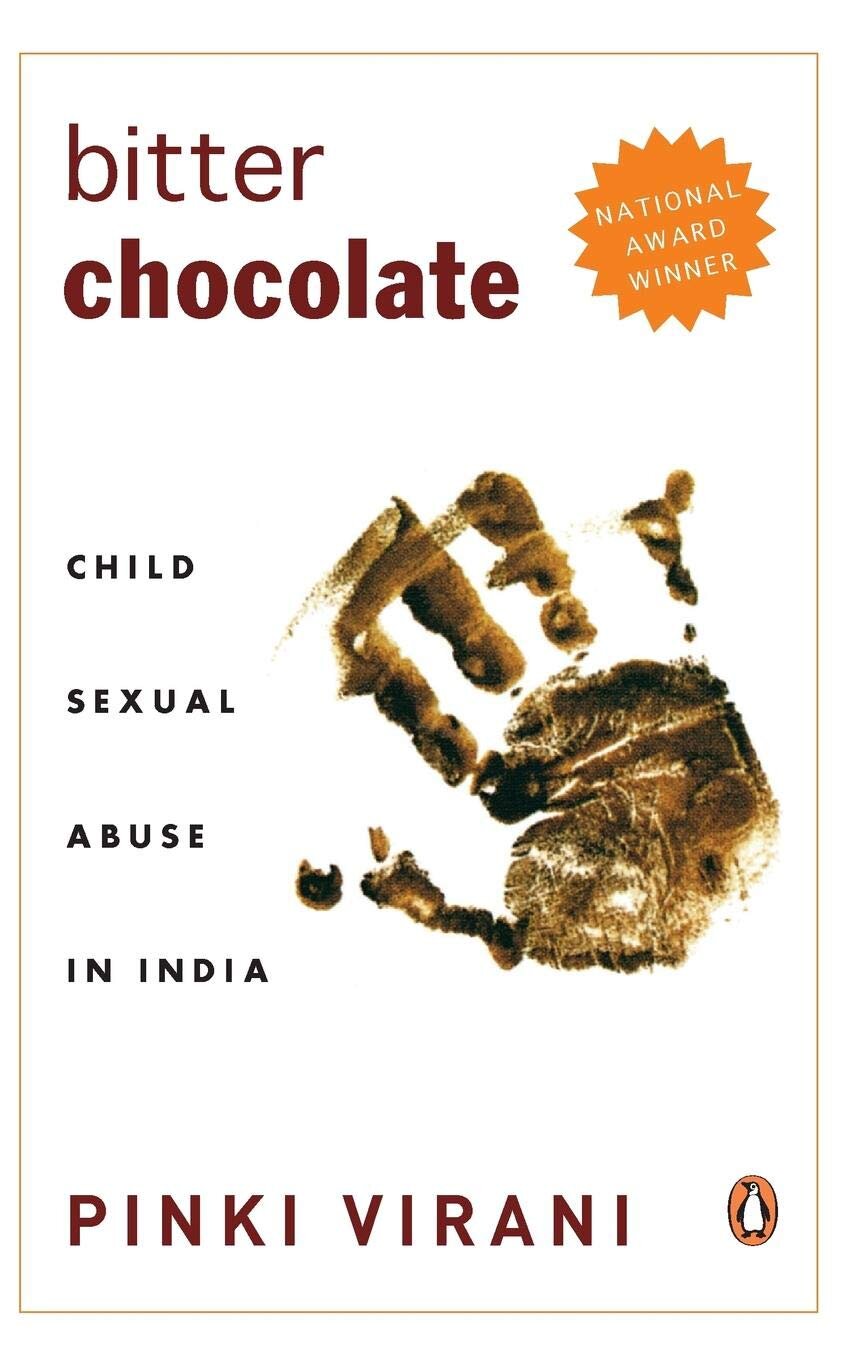A harsh truth to digest: Revisiting Pinki Virani’s Bitter Chocolate
In Bitter Chocolate (2000), Pinki Virani turned the spotlight on the extent of child sexual abuse in India, and the possible ways forward to address the challenges with this issue.
Trigger warning: Child sexual abuse / sexual abuse
“I refuse to be a victim”- Pinki Virani.
Pinki Virani begins her 2000 book Bitter Chocolate with a trigger warning, a warning that would be apt to repeat before analysing this landmark work again—a work that explored and challenged child sexual abuse in India—two decades after its first publication.
If, as a reader of the book, you have been sexually abused, please know first-it was not your fault. Some of you may nevertheless feel unsettled while reading sections of this book. It is alright to feel this way, child sexual abuse is unsettling; anyone who is not unsettled by this subject would be the one who is a problem.
On 15th August this year, the day we celebrate our independence, a 13-year-old girl was kidnapped and gangraped by her neighbour when she went to the bathroom in New Delhi. This case was the fourth case of assault on a minor in a period of 10 days in the nation’s capital. On the same day, a 13-year-old Dalit girl was raped and murdered in Uttar Pradesh’s Lakhimpur district. She was thrown in the fields with eyes gouged and her tongue slit. There are many more reports which were coming out of states all over the country. There are many instances of rape which continue to go unreported. Cases of rape and abuse fill up our daily newspapers. The instances have become so painfully common that they have been almost normalised.
The frightening reality that we have all come to terms with is that in India it is an everyday occurrence. As the data revealed by the National Crime Records Beureau reveal, there were 33,997 cases of rape recorded in the country of which 9,433 cases reported were that of children. Furthermore, a study by the Mint revealed that 99.1% of women do not even report cases of sexual assault. The above statistics are just another reminder of the deep-rooted troubles with rape and abuse in our country. As a nation, rape continues to remain an uncomfortable discourse, left preferably undiscussed. Cases of child sexual abuse even more so, because any discussion would force us to confront the nature of our toxic societal culture.
Our legal systems are not friendly for survivors, who are often forced to recount instances of assault, while they are being cross-examined. This is especially difficult in the instance wherein the abuser is someone who is known to the child. There is no therapeutic support or counselling given to the survivor who is expected to fend for themselves.
Virani, a veteran journalist and novelist wrote the disturbing testament Bitter Chocolate: Child Sexual Abuse in India to confront this very subject. As Virani describes, CSA is one of the darkest hidden secrets of many Indian families. It is something that impacts people of all social standings, and of course, is prevalent across the globe. This one-of-a-kind book is divided into three sections or notebooks to help the reader understand CSA from multiple angles.
In Notebook 1, the author elaborates on what constitutes CSA, which I will share here as well. Child Sexual Abuse includes:
● An adult exposing his, or her, genitals to a child or persuading a child to the same.
● An adult touching a child’s genitals or making the child touch the adult’s genitals.
● An adult involving child in pornography, which includes showing a child pornographic material.
● An adult having oral, vaginal or anal intercourse with a child.
● Any verbal or otherwise sexual suggestion made to a child by an adult.
● An adult persuading children to engage in sexual activity among themselves.
● An adult inserting foreign objects into a child’s body for his, or her, own sexual gratification.
Virani goes on to narrate different experiences of assault that children across the country have faced. While doing so, the author also breaks several myths around child sexual abuse. There have been cases of assault against boys as well as girls. In a majority of the cases the assault is not done by an outsider, but is done by someone within the family itself. Perpetrators and attackers were not only men, there are many cases of women who assault young children.
Secondly, in many cases children are assaulted by other children. In some situations, it may be because the child does not understand what he/she is doing to the other child, but in many cases, the assault is happening because the child himself/herself was a victim of assault and he/she is continuing this cycle of abuse. This was a particularly disturbing revelation about CSA that the author introduces to the reader. It also provides an important notice to school administrators, that in such cases both children will be in requirement of intensive therapy.
In the second notebook, Virani discusses the aftermath of the assault on the child and how it shapes the adult experiences of the child. The author details both the short term and long term impacts of CSA which can include bed wetting, hysterical reactions, avoiding certain adults, oversexualised behaviours, use of cuss words, and long term issues include mental health problems (anxiety, fear, depression), alcohol, smoking or drug abuse, self-injury or even suicide amongst other symptoms. Children themselves can become abusers.
From the statistics Virani shares, there is a clear increase in the number of reported CSA cases as the years progressed. It makes one wonder how many of those abusers were themselves abused. Our inability to address this issue of child sexual abuse is evidently perpetuating this cycle.
In the third notebook, Virani addresses the larger legal framework which allows for the continuity of CSA in the country. She also addresses potential next steps to address this rampantly prevalent issue of CSA in the country. She highlights how legal systems are grossly inadequate to support survivors of CSA.
Our legal systems are not friendly for survivors, who are often forced to recount instances of assault, while they are being cross-examined. The whole ordeal may happen in the presence of the abusers. This is especially difficult in the instance wherein the abuser is someone who is known to the child. There is no therapeutic support or counselling given to the survivor who is expected to fend for themselves. Additionally, in most cases the abuser is not convicted; only cases of penetration are taken seriously.
Virani offers several approaches that should be taken to address this issue. (1) The need to be stricter laws against perpetrators of CSA. (2) A child-friendly process to deal with the matter, which include not having the child having to be cross-examined or repeat the matter in excruciating details to strangers. (3) Child Protection Units to provide counselling to children and Child Protection Courts to handle all cases where the survivor is a minor.
The author also shares approaches for parents to ensure the safety of their children. (1) Provide a safe space for children in the home, so that they can speak out in the instance of abuse. (2) Being aware of the child. (3) In the instance wherein a child discloses instances of assault, the parents need to deal with the revelation without blaming the child. After all, the most important thing to remember is that the child is not responsible for the assault.
Twelve years after Bitter Chocolate was published, the Protection of Child from Sexual Offences (POSCO) ACT was passed. The law incorporates suggestions from Bitter Chocolate as well as additional recommendations made by the author to address cases of child sexual abuse in the country. While it is not the only solution, it is a step in the right direction.
Virani’s outlook is shaped by her own personal experiences with assault, which she very bravely puts forward in the book. Her book is particularly important because it came at a time when discussing sexual assault—especially child sexual abuse—was a true hurdle to cross. She makes readers acknowledge the presence and the extent of CSA in the country and the possible way forward to addressing the issue.
Bitter Chocolate is a harrowing read, which will leave any reader very disturbed, and the author’s trigger warning should not be taken lightly. While it is especially difficult to read the personal narratives that Virani shared, it is an important text for all—and especially those who work with children—to confront the dark truths of our society.
***
Nikita Chatterjee is a student of development studies from Azim Premji University. She is working as a freelance journalist and has contributed to various publications. You can follow her on Instagram: @nikitachatterjee10.


